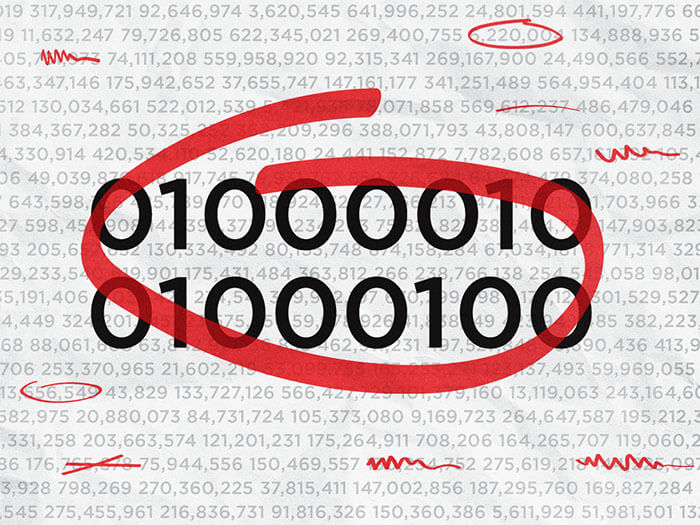
Why CPAs are on the frontlines in the battle against bad data
 As the world generates more information, CPAs occupy a unique role in ensuring it remains reliable and trustworthy
As the world generates more information, CPAs occupy a unique role in ensuring it remains reliable and trustworthy
In 2011, the world produced 1.8 zettabytes of data. Is that a lot? According to tech research firm IDC, 1.8 zettabytes—or 1.8 trillion gigabytes—is the equivalent to every person in the world having 215 million MRI scans every day for a year. Ten years ago, IDC called 1.8 zettabytes a “colossal” amount of data. Now we know better.
In 2020, IDC reported the world created, captured, copied and consumed an even more astounding 59 zettabytes of information. And the pace of growth is accelerating. The amount of data produced over the next three years will likely exceed that generated over the past three decades. With sensors now embedded in all manner of devices—from Fitbits to thermostats—the Internet of Things alone is predicted to generate 80 zettabytes of data by 2025. No one uses “colossal” to describe the amount of data the world produces anymore—the risk of appearing foolish in a few years’ time is simply too great.
Big Data is transforming every industry, government, academic sphere and profession. As the sheer volume of digital information generated is now far beyond the capacity of human minds to sort through and organize, this in turn has necessitated an ever-greater reliance on artificial intelligence (AI) and machine-learning tools to make sense of it all. As the traditional custodians and guarantors of financial information, accountants now find themselves at the centre of the digital revolution—and dealing with all the risks it entails.
“Anything to do with trust and ethics regarding data has always been a fundamental component of the accounting profession,” says Laura Friedrich, a principal of the accountancy research and standards firm friedrich & friedrich corp. based near Whistler, B.C. “With big data, lots of these aspects of professional accounting will stay the same. But, due to the vast quantity of information—and with much of it coming from sources that aren’t easily understood, like AI—these tasks are about to become much broader in scope. And one of the big challenges right now is how to tell the difference between good and bad data.”
In a world where almost every source of information is vulnerable to being faked, manipulated or misrepresented, it falls to accountants to ensure Big Data does not become Big Bad Data.
To properly consider how the accounting profession will be affected by the looming digital transformation, it’s convenient to divide Big Data into three distinct components: collection, access and analysis, says data governance expert Michel Girard, a senior fellow at the Centre for International Governance Innovation (CIGI), a Waterloo, Ont.-based think tank. Each step in what Girard calls the “data value chain” offers a new opportunity for organizations. Each is also at significant threat of being tainted or led astray by data that cannot be trusted. And each presents the accounting profession with an opportunity to bring their existing skills and reputation for trust and ethical behaviour to bear in new ways.
DATA COLLECTION
Collecting, describing, labelling and annotating data so that whoever uses it next has confidence that it is useful information is the first and, arguably, the most important stage in the data value chain. But assembling high-quality data is not simply a matter of hooking a hose up to a sensor and letting it flow, Girard warns. “If the data is incomplete, inaccurate or not impartial, then you will have big problems downstream.” His work at CIGI cites research showing large U.S. businesses estimate the cost of poor-quality data, including wasted effort and unreliable results, runs an average of US$15 million per year. Garbage-in-garbage-out is an expensive proposition, especially in the Big Data world.
Accountants are ideally suited to ensuring and certifying the quality of data within an organization, observes CPA Mike Lionais. “Accountants have always used data in their decision-making. That’s why the profession exists,” he says. In 2019, Lionais was seconded from the federal Treasury Board of Canada Secretariat to consult with CPA Canada on its Foresight project, which seeks to reimagine the accounting profession amid the digital revolution; he now works in the private sector. What’s different about Big Data, Lionais notes, is that it lacks the traditional structures and rules associated with financial data that are so familiar to accountants. The information now being collected could consist of vast reams of consumer behaviour data or observations on production processes or ESG indicators and on and on. Besides the disparate nature of its provenance and lineage, data can also entail ethical issues about how and why it was collected.
For Lionais, the key question accountants must ask about all data is whether it is “fit for purpose.” This requires determining what flaws it may contain, either as gaps, mistakes or faulty assumptions. Less-than-ideal data can still be used, with appropriate cautions, he says. But even data that’s entirely factual and complete may still represent bad data if it is unfit for the specific purpose at hand.
It’s important to understand how all data has been collected and whether it is, in fact, fit for purpose, says Lionais. “There is a real role for accountants to ask: Is the data appropriate to the questions you want answered? And, if not, can you get better data?”
The final piece to the data value chain is analysis—the conversion of all those reams of information into actionable insights
DATA ACCESS AND SHARING
After data has been collected and deemed suitable for the intended purposes, it then needs to be disseminated. But ensuring only the appropriate people and organizations have access to this data brings its own challenges and risks. Girard notes the COVID-19 pandemic has had a dramatic impact on how and where data is used. With more employees working remotely, and with firms using a variety of cloud services to facilitate this process, sharing data is now more risk-prone than it was when everyone worked at a single site connected to a single server.
“This creates huge issues surrounding privacy and cybersecurity,” Girard says. “No one will want to share their data if they don’t have confidence that it will be properly managed.” A burgeoning legal literature on potential liability issues arising from failures to properly maintain and protect data points to the looming risks for both organizations and individuals.
“People will want assurances in writing that data value chains are trustworthy. You will need to demonstrate a duty of care,” Girard advises. “And CPAs can play a very important role in managing trust in this process.” Again, the basic skill set is similar to how accountants currently exercise control over financial information. But the scale and scope will expand dramatically to cover many new forms of information.
ANALYSIS
The final piece to the data value chain is analysis—the conversion of all those reams of information into actionable insights that can hopefully add value to an organization. “Data needs to be processed and interpreted and acted upon,” Girard notes. “This is the job of someone who knows and understands the business aspects of the situation and is comfortable with giving the right advice. It’s not the job of the IT guy.”
Proper Big Data analysis requires close collaboration between accountants and data scientists and data engineers with expertise in AI, but the final product must inevitably rely on business acumen. “The role of the accountant is not to build the black box,” notes Lionais. “It is to follow the thread from data to insight and to ensure it is trustworthy. You can put diamonds in at one end and still get garbage out at the other end if your analysis is wrong. You need to understand the problem you are trying to solve.”
A wide range of errors can occur at the analysis stage, including confusing correlation with causation and simply relying on outdated assumptions. The unreliability of many election poll results, particularly during the 2016 U.S. presidential election, provides ample evidence of how analysis of large data sets can go very wrong. Ethics is also a major preoccupation with analysis. Concerns that racial biases can be baked into algorithms, such as facial recognition programs or mortgage lending tools, for example, highlight the importance of proper oversight in how Big Data is used. “I don’t see data scientists or mathematicians being trained to pass judgment on the ethical use of data,” says Girard. “Nowhere do we see a profession that can handle these issues of quality, trust and ethics—with the exception of CPAs.”
STANDARD SETTING
Beyond preventing the use of bad or inappropriate data within organizations, accountants also have an important role to play in establishing the necessary cross-border legal and ethical safeguards covering the entire Big Data world. Without clear and enforceable global rules regarding the collection, access and analysis of all this new information, the spectre of Big Bad Data looms large everywhere.
Brian Friedrich, the other half of friedrich & friedrich corp. and chair of the Technology Working Group of the International Ethics Standards Board for Accountants (IESBA), has been deeply involved in revising ethical guidelines for accountants in light of the digital revolution. While the relevant concepts of ethical use of data are already incorporated into national accounting codes of conduct, a multiplicity of data-specific guidelines from organizations including the OECD, the European Union, Microsoft, IBM and various national governments is creating “uncertainty about which framework applies” for best practices and compliance, he observes. “The core elements of all these frameworks are the same, so why do we have so many different versions?” Such duplication suggests a need for amalgamation. With the accounting profession already deeply involved in data governance and in standards setting, Friedrich says it makes sense for CPAs to have a voice at the table when global data governance standards are set.
“You can’t have localized standards if you are trying to make sense of the Big Data universe,” agrees Bruce Cartwright, CEO of the Institute of Chartered Accountants of Scotland. Cartwright’s organization recently contributed to CPA Canada’s study of Big Data and he considers this sort of international combined force the best way forward. “Collaboration will allow us to bring more resources and intellectual firepower together and avoid duplicating efforts. And CPA Canada has been at the forefront of this thinking,” says Cartwright.
While the opportunities unleashed by Big Data appear limitless, the risks entailed are equally daunting. “Bad data will set us back greatly,” says Girard. “We need high-quality, trustworthy data if we want to benefit from the coming digital transformation. And, to do that, we need the right systems and controls in place.” For CPAs, that means applying their core competencies of trust and ethics to the Big Data world at home and abroad.
DATA SET
Find out how CPAs are getting ready for big data and how their role relates to it. Plus, learn about CPA Canada’s Data management certificate program and see where the profession is headed.